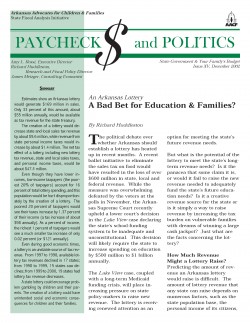
Estimates show an Arkansas lottery would generate $169 million in sales. Only 33 percent of this amount, about $55 million annually, would be available as tax revenue for the state treasury.
The creation of a lottery would decrease state and local sales tax revenue by about $9.6 million, while revenue from state personal income taxes would increase by about $1.4 million. The net tax effect of a lottery, including new lottery tax revenue, state and local sales taxes, and personal income taxes, would be about $47.4 million.
Even though they have lower incomes, low-income taxpayers (the poorest 20% of taxpayers) account for 16 percent of total lottery spending, and this population would be hurt disproportionately by the creation of a lottery. The poorest 20 percent of taxpayers would see their taxes increase by 1.37 percent of their income (a tax increase of about $98 annually). As a percent of income, the richest 1 percent of taxpayers would see a much smaller tax increase of only 0.02 percent (or $121 annually). Even during good economic times, a lottery is an unstable source of tax revenue. From 1997 to 1998, available lottery tax revenues declined in 17 states; from 1998 to 1999, 15 states saw declines; from 1999 to 2000, 19 states had lottery tax revenue decreases.
A state lottery could encourage problem gambling by children and their parents. The creation of a lottery could have unintended social and economic consequences for children and their families.
